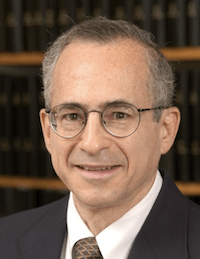Gary H. Posner
1943 – 2018
First and foremost, Gary Posner was a good person. He was a solid professional. He cared for others, extended himself to the utmost, was a professional’s professional. He was a responsive collaborator and inspiring teacher. He could be counted upon, and he asked to be counted upon. He spoke softly, yet he acted with confidence. He was conservative in his profession, yet liberal in his social views. He was analytical in his thinking, yet deeply religious in his beliefs. He was short in stature, yet tall in life.
Gary was a planner. I remember his planning and carrying out preliminary experiments, as a postdoc in the laboratory of William G. Dauben at Berkeley (with Dauben’s permission), so that his first projects as an assistant professor would succeed. Throughout his career, he was methodical and realistic in his plans, estimating his resources and strategizing his activities. The one thing he could not anticipate and could not plan for was the slow and horribly debilitating effects of Parkinson’s disease that would rob him of enjoying his retirement, which he had hoped to fill with well-deserved time with his four boys and his grandchildren, who he adored, and pursuit of his photographic ambitions (he was a very talented photographer with a superb eye).
Gary was born and raised in New York City into a deeply religious Jewish tradition, which guided his principles throughout his life. He earned an undergraduate degree in chemistry from Brandeis in 1964 and Masters and Doctoral degrees in organic chemistry from Harvard (with E. J. Corey) in 1965 and 1968, respectively. After his postdoc with Dauben at Berkeley, he joined the Department of Chemistry at Johns Hopkins where he remained for 47 years until his retirement in 2016. He also had a long-term affiliation with the Malaria Research Institute at the Johns Hopkins Bloomberg School of Public Health. During his years at Hopkins, he supervised more than 60 Ph.D. students and almost as many postdoctoral fellows. Posner was a member of Organic Reactions’ Editorial Board from 1977 – 1988 and a member of its Advisory Board from 1989 until his death in 2018, altogether over 40 years of continuous service. He also authored two chapters in that series on organocopper chemistry. Gary served as executive editor of Tetrahedron Reports (1996 – 2005) and on the editorial board of Steroids from 1996 until his death.
Posner’s 375+ scientific publications and patents cover a wide range of synthetic organic chemistry (new synthetic methods and natural product total syntheses) and medicinal chemistry. His earliest research involved the development of organocopper reagents, which led to many publications, review articles and a textbook An Introduction to Synthesis Using Organocopper Reagents. The Corey-House-Posner-Whitesides reaction, the reaction of a lithium diorganocuprate with an organic chloride, is named in part after him (equation 1). His synthetic eye focused on other aspects of organocopper chemistry, the Diels-Alder reaction, conjugate addition and domino cascades, materials and surface chemistry, and natural products research. In 2011, over 40 years after his first publication on organocopper reagents, he published a paper on the use of organocuprates to convert carboxylic acids directly to ketones.
In the area of medicinal chemistry, he and his research group studied isothiocyanates related to constituents of broccoli for their anticancer properties, vitamin D analogues for the treatment of skin disorders and cancer and neurodegenerative disorders, endoperoxides and artemisinin-like compounds as antimalarials and antiparasitic agents, novel opthalmic materials, and artemisinin-derived dimers as antileukemic drugs. As evidence of his growth from organic chemist to medicinal chemist, some of the journals in which he published in his last decade of research include Oncotarget, Bioorganic Medicinal Chemistry, Journal of Medicinal Chemistry, Antimicrobial Agents and Chemotherapy, Journal of Steroid Biochemistry and Molecular Biology, Carcinogenesis, Journal of Endocrinological Investigations among others.
Posner was the recipient of numerous awards and honors. In 1964, he was elected to Phi Beta Kappa honor society at Brandeis. In 1987, he was named Maryland Chemist of the Year by the Maryland Section of the American Chemical Society. In 2004, he received the Arthur C. Cope Senior Scholar Award from the American Chemical Society. Also in 2004, he received the Brown University Award for Excellence in Vitamin D Research. In 2015, he was inducted into the National Academy of Inventors. He was invited to lecture around the world and was a plenary lecturer at over 70 scientific meetings. He received several teaching awards at Johns Hopkins including two via student nominations.
Gary was immensely proud of his two sons from his first marriage: Michael (a professor of statistics at Villanova) and Joseph (a software developer), and of the two sons whom he “inherited” upon his second marriage and who he considered his sons as well: Mike Nachshen (a former Major in the U.S. Air Force and now a public relations professional in the aerospace industry) and Saul Nachshen (a video producer). In addition to his four sons, Gary leaves his second wife Judith Stamberg, his grandchildren Yael, Jonah and Ari Smith Posner, and many other family members, friends, students and colleagues.
I was asked by Scott Denmark, Editor in Chief of Organic Reactions, to write this memorial. Gary was a dear friend of mine for 50 years, and it pains me greatly to think of his death. Yet Scott’s request brings me some measure of satisfaction, as I am sure it would for Gary himself and for his friends and colleagues and for the archives of chemistry, to reflect on Gary’s many achievements and the manner in which he conducted his life.
I end this memorial by citing some of the adjectives provided by his sons, several of his colleagues, and from my own experiences. Gary was a gentle soul, kind, humble, modest, generous, patient, supportive, and compassionate. He was thoughtful, optimistic, unflappable, and adaptive. He was wise, meticulous, thorough, rational, resourceful, and attentive. He was a mensch.
Jeffrey I. Seeman
Department of Chemistry
University of Richmond


